Why have British universities stayed silent on the assault on academic freedom in Hong Kong?
The siege may, for the most part, be over but with more than 5,000 pro-democracy protesters in detention, the shadow of a final onslaught lingers over young Hong Kongers. Even their British counterparts have been unable to escape the reach of pro-Beijing intimidation, reports Brian McGleenon

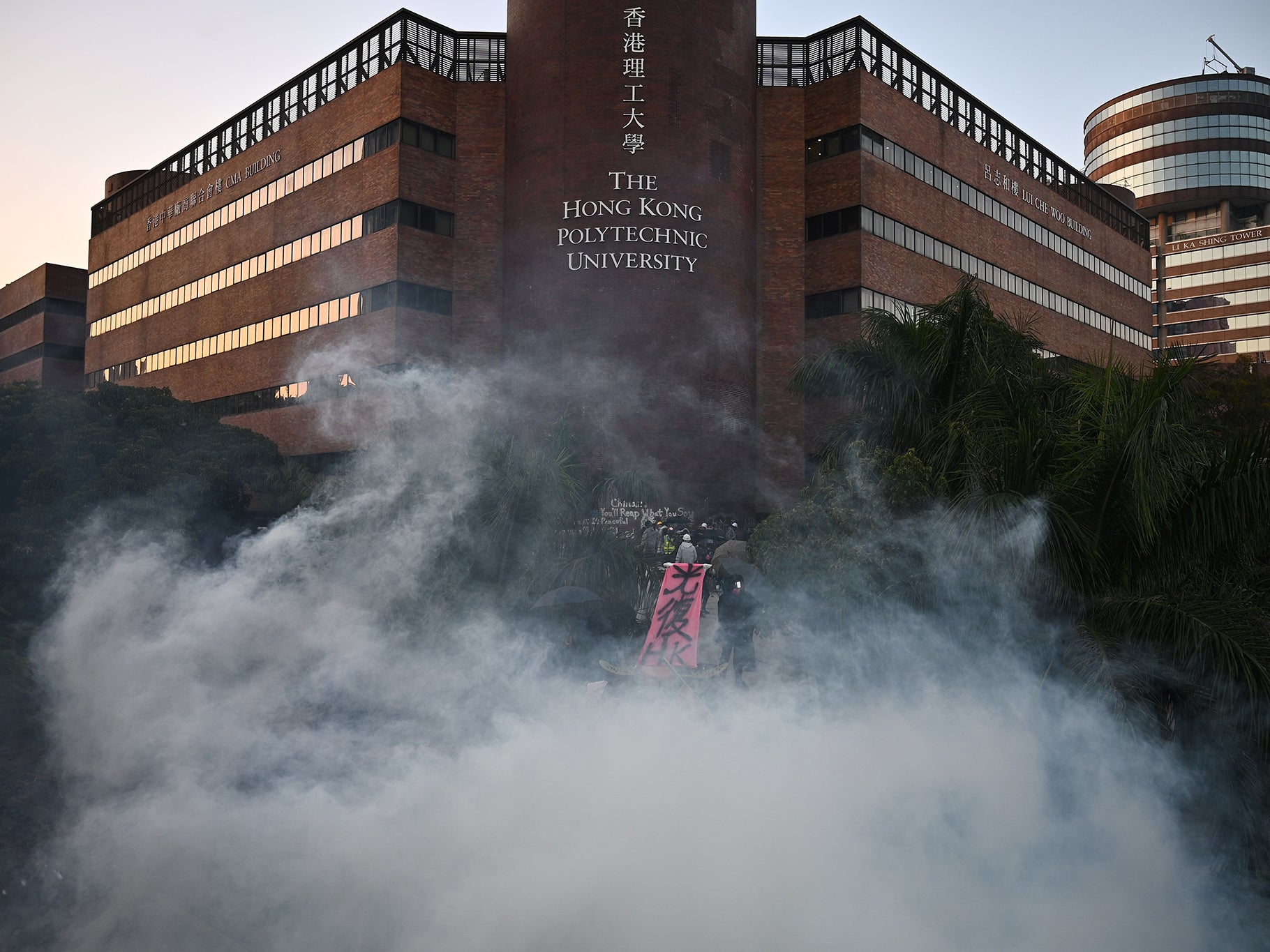
Right now I don’t want to leave. We are trapped. If we leave, we will be imprisoned for 10 years. I have to stay until the end,” one student protester who had been holed up inside Hong Kong Polytechnic University during the 11-day siege told me last week.
Another, via an encrypted messaging app, described the predicament of those who had barricaded themselves inside: “The students trying to escape have asked the police if it is safe to do so, but when encouraged to come out they are shot with rubber bullets, almost at point-blank range. They then shoot teargas canisters, and many of those leaving the campus cannot breathe and drop to the floor.”
Pastor Tam, a local cleric who led the parents of those inside to the police lines, expressed fears there would be “suicides in acts of desperation and despair”. As the siege neared its conclusion, one of the activists upholding their last stand messaged: “We are still surrounded. We refuse to leave. We will be charged with rioting, a conviction that could carry a 10-year sentence. We have little food and water left.”
By Wednesday, the campus was almost empty. Images of Hong Kong police searching the abandoned classrooms for remaining protesters and leftover weapons litter media outlets around the world. Police reported that more than 1,100 had left the campus after having their identities registered. Dozens more are believed to have escaped.
Meanwhile, latest reports on the ground suggest several students are stilled barricaded in different parts of the campus building. Police are trying to persuade the holdouts to allow them to enter with social workers to assess their mental and physical health. They’ve promised not to arrest them “on the spot”, but those still left think it’s a Trojan horse tactic and are reluctant to reveal themselves.
With more than 5,000 protesters detained since the anti-government movement began almost six months ago, the unrest is far from over. Hong Kong is still not a functioning democracy under the rule of law. Lead activist Joshua Wong, who was banned from standing in the recent elections, is still not allowed to travel internationally. One activist showed me a video of detained demonstrators being driven away in a bus to a location on the border with mainland China.
Pan-democracy candidates in Hong Kong won almost 90 per cent of the district council seats in Sunday’s elections, a victory seen as an overwhelming rejection of pro-Beijing political forces. The reaction from China has been to demand more oppression of democracy activists and increase calls for the “patriotic re-education” of the special administrative region. In light of the election results, Beijing’s defence ministry spokesperson Ren Guoqiang threatened that the People’s Liberation Army was “determined and ready” to safeguard China’s sovereignty and the long-term stability of Hong Kong.
Hong Kong Polytechnic was one of several universities across the city caught up in police raids on its “bastions of academic freedom”, sparked in April by the government’s attempt to bring in legislation making it easier to extradite criminal suspects to the mainland. It began with major protests in June and has snowballed into the biggest challenge to Beijing’s authority since control of the city was handed back to China by Britain in 1997.
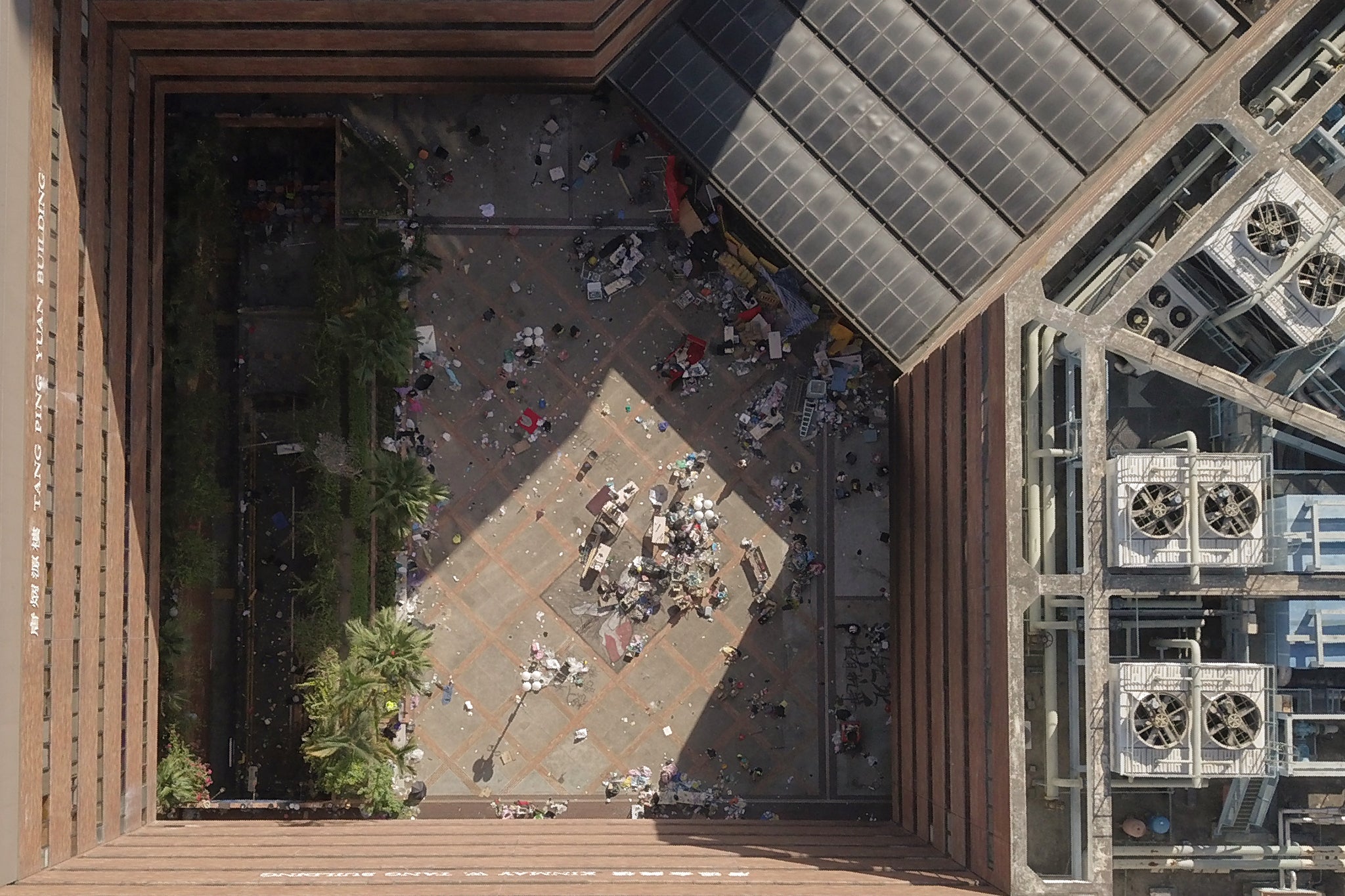
On 11 November, officers stormed the Chinese University of Hong Kong (CUHK) campus and began making arbitrary arrests, under the justification that it was a base of operations for the pro-democracy movement. Protesters responded by blocking a major arterial highway. As police closed in, activists took refuge in Hong Kong Polytechnic, leading to the bitter standoff that lasted for almost two weeks.
A whole generation has found itself on the wrong side of the law, with Hong Kong declaring war against its own young people. These exhausted and embattled teenagers have had their trust in the civic structures around them, and their faith in the older generation, shattered
The mountain campus, sited within dense trees and surrounded by a sprawling network of steep roads, has become the fulcrum of the five-month battle between opposing ideologies; ultimately, a battle between those who uphold the integrity of the Communist Party of China above all other things and those who espouse the “seven don’t speaks”, which forbid discussion of universal values, freedom of speech, civil society, civil rights, historical errors of the CCP, official bourgeoisie, judicial independence, and even Winnie the Pooh.
At CUHK, there is a sense of trepidation that a final onslaught, as one academic put it, “is certain in the near future”. Jacky Chan Man Hei, the external secretary of the students’ union, estimated that over 2,300 used cans of teargas were collected in the campus after the blockade, “the largest amount of teargas used in one day during the last five months of protest”, he says.
Students are replenishing their ranks and rebuilding their defences, but the confined conditions are a breeding ground for vexations. Chan says: “A certain ecosystem has built within the campus, albeit not a perfect one, with disagreements about the strategic plan for the next few days.”
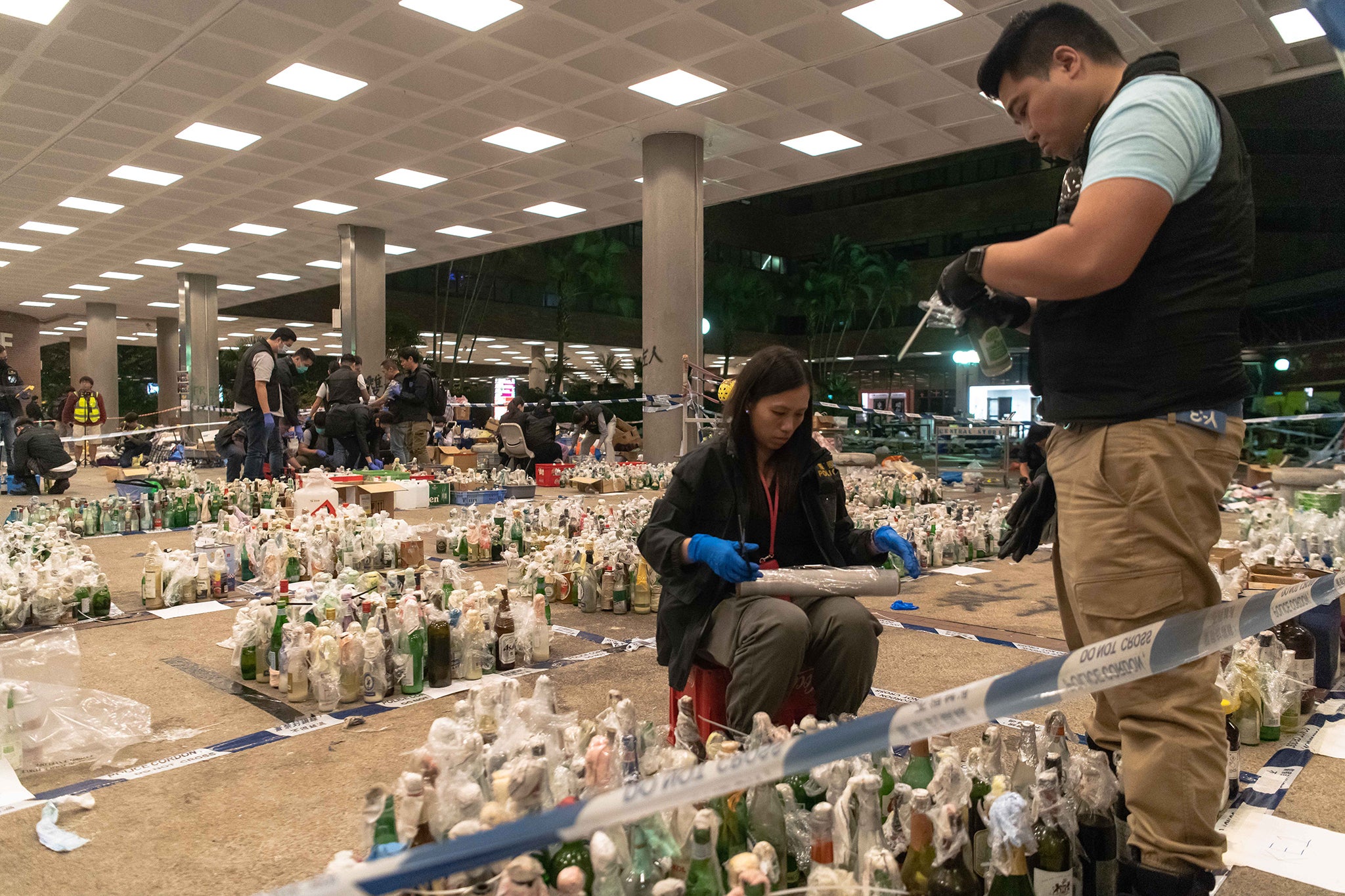
There’s also a split between senior staff and students. During the siege, the university’s vice-chancellor Rocky Tuan was teargassed as he attempted to counter police actions to storm the campus. But, in a statement released on 15 November, he suggested he would seek the assistance of the government as “more than a thousand people in masks have arrived at the school following online calls to bolster reserves after clashes”.
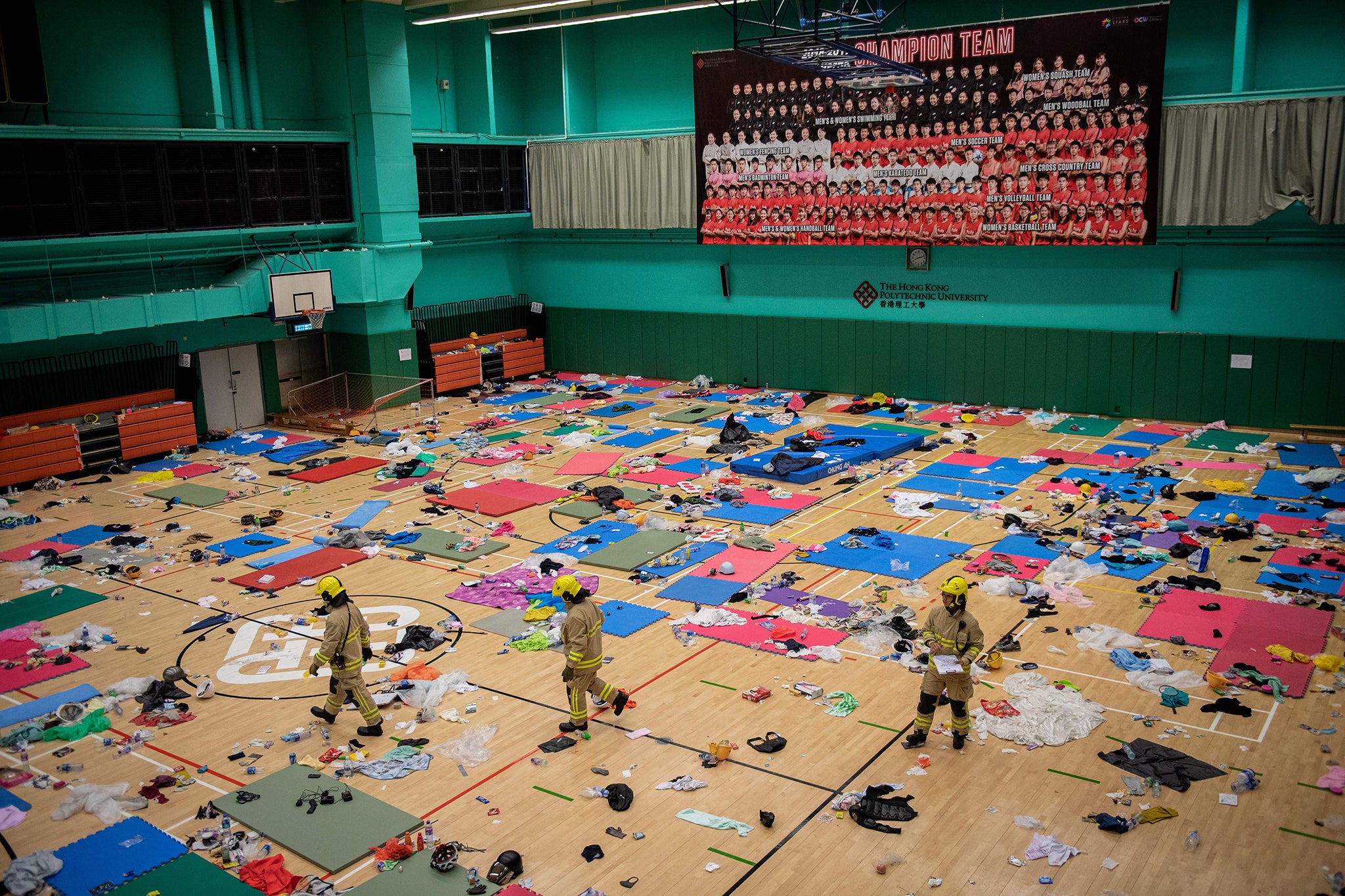
But unlike the end of the assault on CUHK, there will be no victory songs at dawn from the roof of Hong Kong Polytechnic. This time, the insidious words of China’s former vice-president Li Yuanchao will cast their shadow over the halls and offices of Hong Kong’s prestigious universities. In the wake of the Occupy Central campaign that sparked the 2014 protests, he alluded to an ensuing witch hunt. “The really interesting part of the show is yet to come,” he warned.
Fear of such reprisals has muffled dissenting voices. Governing bodies are being quickly and quietly outfitted with pro-government members. But many academics and students are left wondering: why are their British counterparts staying silent on Beijing’s assault on “university autonomy and academic freedom”?
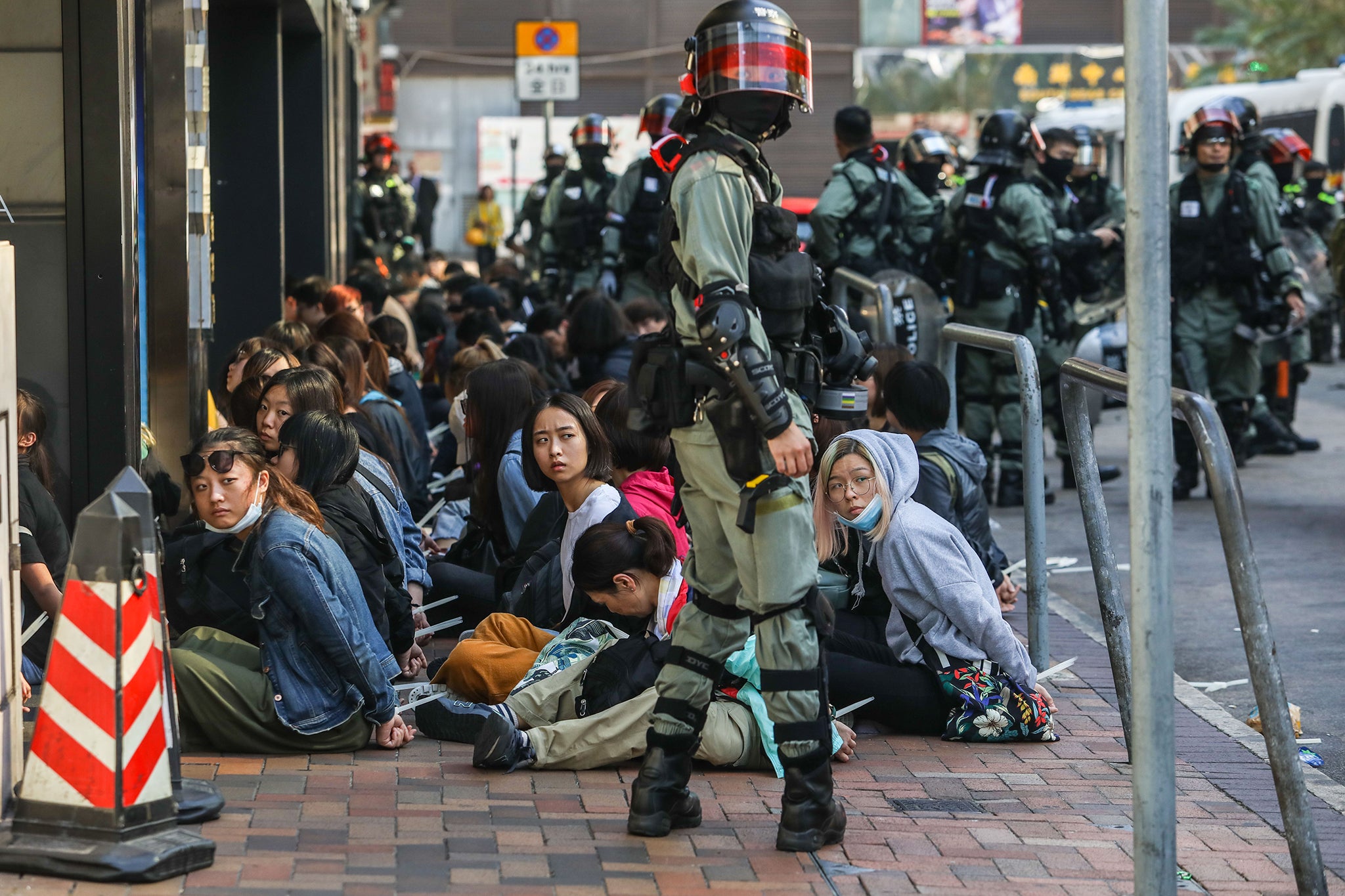
British academic institutions such as the universities of Warwick, York, Oxford and Cambridge have remained conspicuously silent and have come under fire for “limiting freedom of speech” and failing to leap to the defence of their core common values. But even in the UK, Hong Kong pro-democracy student activists cannot escape the reach of pro-Beijing intimidation.
In the same way that countries from the Muslim world that benefit from Beijing’s Belt and Road Initiative have been criticised for refusing to sign letters condemning the incarceration of their co-religionists in Xinjiang, UK universities have failed to speak out against attacks on academic freedom and institutional autonomy because of their own financial entanglement.

At the University of Warwick, images placed on a “Lennon Wall” by students to show solidarity with protesters in Hong Kong were removed at the behest of pro-Beijing students. Similarly, at the University of York, the Chinese Society complained about images and newspaper cuttings about the demonstrations in Hong Kong, which were subsequently removed.
Whereas many UK-based academics are deeply worried about the increasing violence against young Hong Kongers, administrators often see the former British colony more narrowly through the prism of alumni networking and fundraising
Intimidation of those speaking out in support of the Hong Kong pro-democracy movement intensified further when on Saturday 16 November activists staged a large demonstration at Cambridge University to revoke the Hong Kong chief executive Carrie Lam’s honorary fellowship. The personal details of the student who helped organise the demonstration were subsequently leaked online, allegedly by a pro-Beijing PhD student from Wolfson College, and their family have received death threats. Pro-Beijing supporters have increasingly used the tactic of sharing someone’s private information online to encourage mass harassment, called doxxing, as a weapon.
Hong Kongers at Oxford have also expressed the feeling of being gagged by the constant observation of their actions by pro-Beijing students. Students giving out leaflets about the pro-democracy protests in Hong Kong were surrounded by mainland students, some waving the Chinese flag and singing the national anthem. When attending demonstrations, the students from Hong Kong are always outnumbered by their counterparts from mainland China.
This intimidation is not just limited to students. Chan describes how pupils from mainland China have filmed lecturers at his university who speak out against Beijing’s policies. No explanation is given as to the reason for these recordings, but the shadow of some future reprisal lingers.
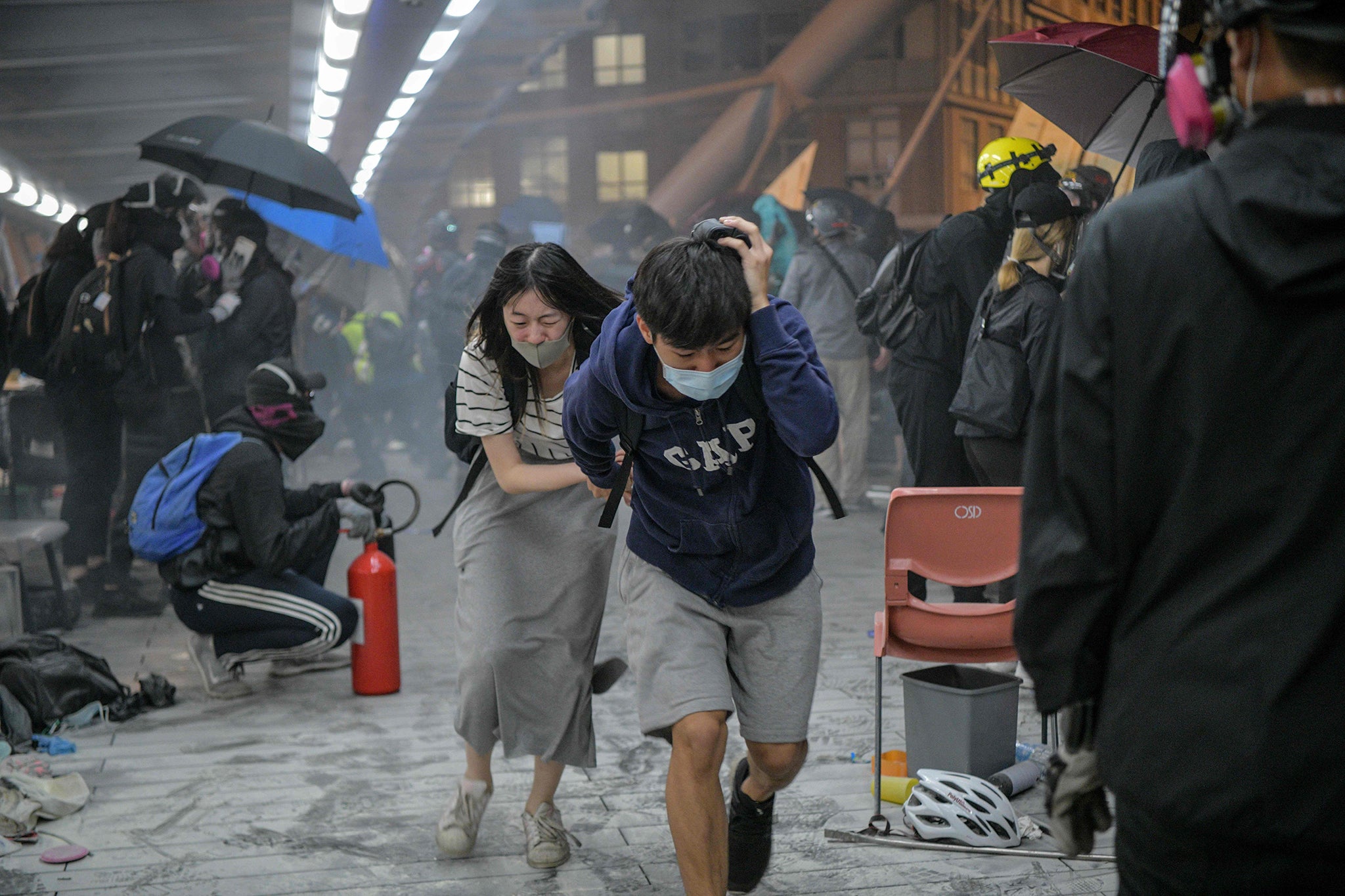
Accusations have mounted that universities in the UK are not doing enough to curb this intimidation and are remaining silent on the disregard for what academic Andreas Fulda, a senior fellow at Nottingham University’s Asia Research Institute, describes as “the autonomy and academic freedom of their fellow institutions in Hong Kong”. This comes on the back of reports that Oxford’s vice-chancellor, Louise Richardson, had been approached by the Chinese embassy and asked to stop the university’s chancellor, Lord Patten, from visiting Hong Kong, where he had been the last governor under British rule. Despite being threatened with the withdrawal of Chinese students, Richardson did not back down.
Fulda says that financial complexities constrain some British universities from taking action. “Whereas many UK-based academics are deeply worried about the increasing violence against young Hong Kongers, administrators often see the former British colony more narrowly through the prism of alumni networking and fundraising,” she tells me. “This doesn’t mean that on an individual level they don’t care about the political situation in Hong Kong. But in the context of the entrepreneurial university, their interests and priorities are clearly different.”

Beijing’s attempts to silence its critics abroad has even reached political circles, where Luke de Pulford, of the Conservative Party Human Rights Commission, has called on British universities to “raise their voices in solidarity and ensure that where Hong Kong students have been silenced by pro-Beijing students that such intimidation is given no room in any institution committed to liberal education.” After a Commons report that the Chinese embassy appeared to be coordinating efforts to curb academic freedoms in the UK, De Pulford stressed institutions were in danger of becoming “wholly-owned subsidiaries of Xi Jinping’s communist state”.
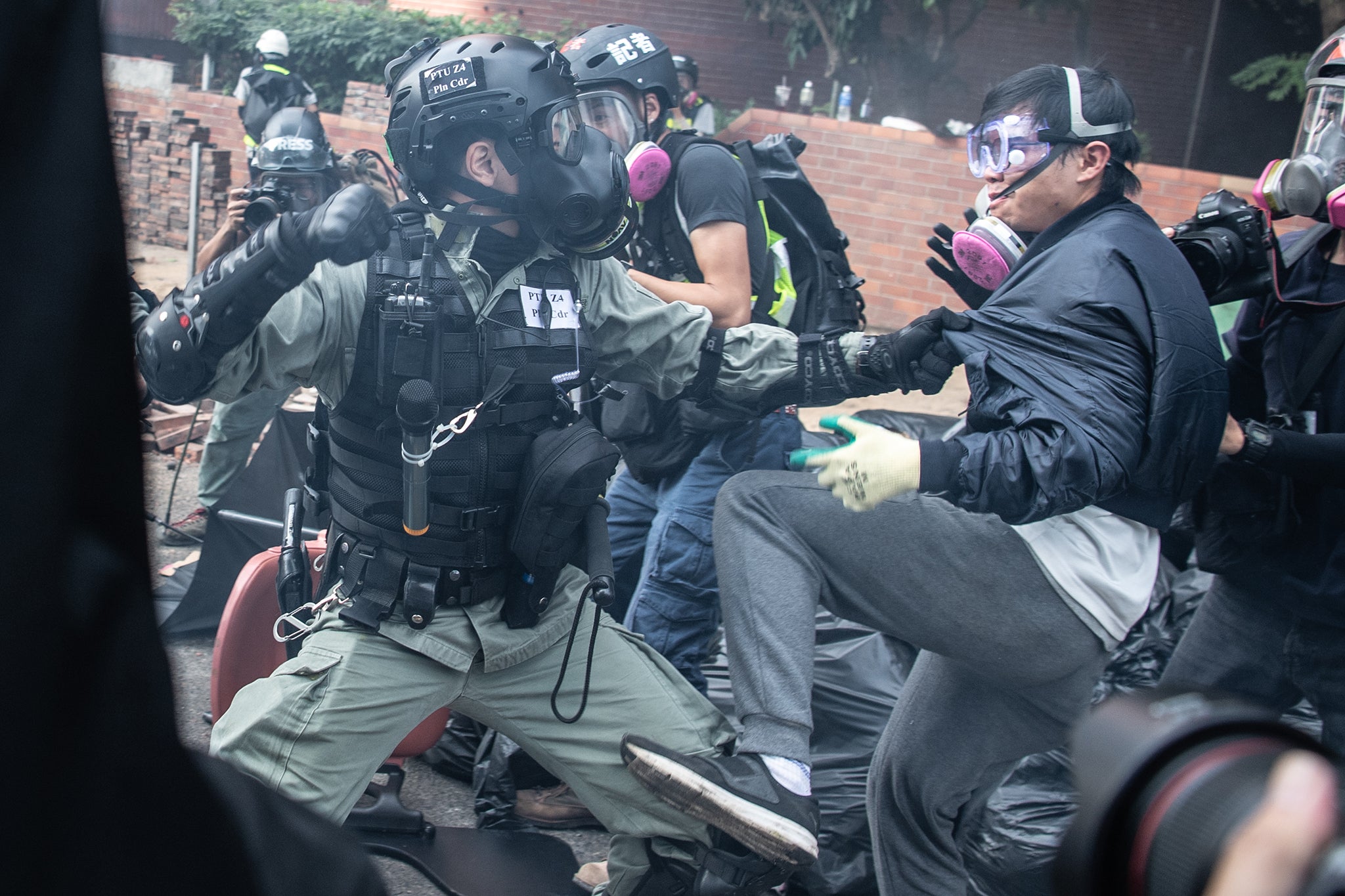
But, Professor Steve Tsang, director of the SOAS China Institute, cautions against concluding that academic outcry is being somehow tongue-tied by a financial reliance on Beijing, maintaining that it is “too early to draw that conclusion”. He argues that some universities are over-dependent on income from Chinese students, but “this is not the same as saying the lack of a reaction from UK universities or academics regarding the Hong Kong Protests is an indication that they have been bought by the Chinese”.
Beijing has re-baptised CUHK as “The University of Rioters”, a moniker the protesters have adopted with pride. The campus they call home has held, unassailed, but at the price of cancelled lessons and corridors that resemble “trenches from the Great War” due to the record amount of teargas used during the siege, which is now degrading into even more toxic chemicals that have the potential to cause heart, brain and lung damage, says Venezuelan professor Monica Krauter.
5,000
anti-government protesters have been detained since June
Gordon Mathews, professor of anthropology at CUHK, says that pro-democracy activists have limited ways to achieve a democratic solution and restore freedom to Hong Kongers, as they are dealing with an “undemocratic and intransigent government, how else can they be made to listen, except by economic warfare?”
All this to say that Hong Kong is still a tinderbox awaiting the spark. A whole generation has found itself on the wrong side of the law, with Hong Kong declaring war against its own young people. These exhausted and embattled teenagers have had their trust in the civic structures around them, and their faith in the older generation, shattered. A deep fracture grows by the minute between the young and the old. And it's one that may never heal.
But Tsang sees an enemy within, one that could see the movement cannibalise itself: the rise of a divisive Hong Kong nationalism. “Hong Kong nationalism is exclusionary, like all nationalism,” he says. Mainland Chinese have been accused of flooding the territory at a pace of “150 per day” and of polluting the demographics of the voting system. Tsang defines the very concept of being a Hong Konger as “myth creation”. He says: “There is a national myth being created of a heroic ‘us’ against an evil ‘them’. In the case of Hong Kong, the evil ‘them’ that has been created is the mainland Chinese, and that is quite ugly. This ideology is misguided, divisive and unwise.”
Tsang’s prognosis for the future of the pro-democracy movement? Bitter, at best. He says: “Beijing will not accept Hong Kong becoming a real democracy.” He describes the idea of any sovereign territory of China becoming a real democracy as having a potential contagion effect. That the Hong Kong government will be unable to cope, “that it will be shown to be inept and so the Chinese government will take over”. Asia’s world city, the famous, fragrant harbour, “will be diminished and changed; it will be the end of the Hong Kong that we knew”.
Join our commenting forum
Join thought-provoking conversations, follow other Independent readers and see their replies
Comments